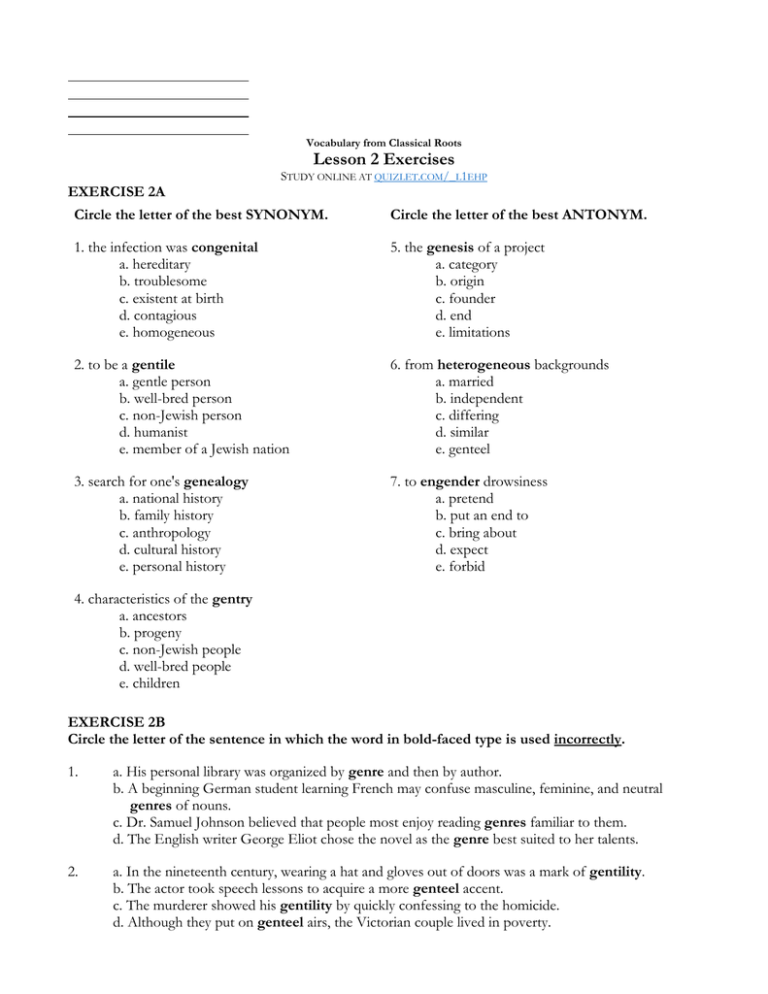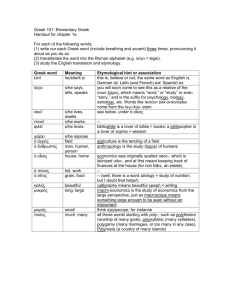Vocabulary from Classical Roots: Lesson 2 Exercises
advertisement

Vocabulary from Classical Roots Lesson 2 Exercises EXERCISE 2A STUDY ONLINE AT QUIZLET.COM/_L1EHP Circle the letter of the best SYNONYM. Circle the letter of the best ANTONYM. 1. the infection was congenital a. hereditary b. troublesome c. existent at birth d. contagious e. homogeneous 5. the genesis of a project a. category b. origin c. founder d. end e. limitations 2. to be a gentile a. gentle person b. well-bred person c. non-Jewish person d. humanist e. member of a Jewish nation 6. from heterogeneous backgrounds a. married b. independent c. differing d. similar e. genteel 3. search for one's genealogy a. national history b. family history c. anthropology d. cultural history e. personal history 7. to engender drowsiness a. pretend b. put an end to c. bring about d. expect e. forbid 4. characteristics of the gentry a. ancestors b. progeny c. non-Jewish people d. well-bred people e. children EXERCISE 2B Circle the letter of the sentence in which the word in bold-faced type is used incorrectly. 1. a. His personal library was organized by genre and then by author. b. A beginning German student learning French may confuse masculine, feminine, and neutral genres of nouns. c. Dr. Samuel Johnson believed that people most enjoy reading genres familiar to them. d. The English writer George Eliot chose the novel as the genre best suited to her talents. 2. a. In the nineteenth century, wearing a hat and gloves out of doors was a mark of gentility. b. The actor took speech lessons to acquire a more genteel accent. c. The murderer showed his gentility by quickly confessing to the homicide. d. Although they put on genteel airs, the Victorian couple lived in poverty. 3. a. The experiment failed because of the heterogeneity of the animals being studied. b. She was so heterogeneous in math that she won every contest. c. Despite the heterogeneous views of its members, the Senate unanimously approved the new Supreme Court justice. d. To assemble a heterogeneous freshman class is the aim of many college admissions directors. 4. a. Charles Darwin shocked many devout Victorians when he suggested that some form of ape was the progenitor of human beings. b. Attending the birthday party were sixty of her progenitors. c. A Daughter of the American Revolution can prove that one of her progenitors fought in the War of American Independence. d. Records filed in Salt Lake City help many people find information about their progenitors. 5. a. The Seminole are an indigenous American people. b. Several kinds of rock found on the California coast are not indigenous but were brought from different locations by shifting geologic plates. c. No matter how hard he tried to earn a living, he remained indigenous and dissatisfied. d. The potato is indigenous to South America. 6. a. Production on an assembly line insures almost perfect homogeneity in the cars a factory makes. b. Most dairies homogenize their milk so that cream does not rise to the top. c. After we had homogenized the laboratory, no one could detect a trace of the chemical explosion. d. Some math teachers prefer homogeneous classes so that no student will feel the pace is too slow or too fast. EXERCISE 2C Fill in each blank with the most appropriate word from Lesson 2. Use a word or any of its forms only once. 1. All of the doctor's _________________________ have followed their mother's example and have studied medicine too. 2. Throughout history there have been examples of _________________________ as one group of people finds cause to destroy another. 3. Tom Sawyer's _________________________ plan convinces his friends to do his work–whitewashing a fence. 4. Designed in 1909, Henry Ford's Model T is the _________________________ of today's massproduced automobiles. 5. Students profit from acquiring techniques for reading various _________________________s of literature: poetry, essays, short stories, and novels. 6. Too much competition can _________________________ fear and distrust among students. 7. Although found throughout California, eucalyptus trees are _________________________ to Australia. REVIEW EXERCISES FOR LESSONS 1 AND 2 Part 1 - Circle the letter of the best answer to the following questions about roots and definitions. 1. Which Greek or Latin word means the same as gyne? a. vir b. genus c. humanus d. femina e. anthropos 2. Which Greek or Latin word does not belong with the others? a. humanus b. auto c. anthropos 3. Which pair of words can accurately be used as synonyms? a. progenitor-progeny c. misogynist-misanthrope b. egoism-egotism d. humanism-anthropology 4. Which word is least likely to describe an egoist? a. autonomous b. ingenious c. humanitarian d. gentile e. misanthropic 5. Which of the following explanations of word derivation is incorrect a. Autocrat contains the Greek word for "power." b. Misanthrope contains the Greek word for "man." c. Heterogeneous contains the Greek word for "other." d. Indigenous contains the Latin word for "clan." e. Homicide contains the Latin word for "kill." Part 2 - Substitute the appropriate word from Lesson 1 and 2 for each word or phrase in parentheses in the following paragraphs. No word is used more than once. In nineteenth-century New England, Lyman Beecher was a prominent clergyman whose (1.) _________________________ (offspring) shared his liberal thinking on social issues. Two of the them were Harriet Beecher Stowe, author of Uncle Tom’s Cabin, and the minister Henry Ward Beecher, who adhered to (2.) _________________________ (humanitarian) precepts as a supporter of the anti-slavery movement and the theory of evolution. A(n) (3.) _________________________ (masculine), dynamic advocate, Henry Ward Beecher (4.) _________________________ (propagated) enthusiasm for the woman’s suffrage movement. (5.) _________________________ (Scientists) studying the origins of human beings have discovered a remarkable (6.) _________________________ (sameness) in the peoples (7.) ________________________ (native) to both North and South America. Almost all Native Americans shared not only the same blood type, but also the same immunities. For this reason thousands died in what was for the most part a(n) (8.) _________________________ (annihilation) of whole tribes that had no immune defenses to the contagious diseases brought by European invaders.







